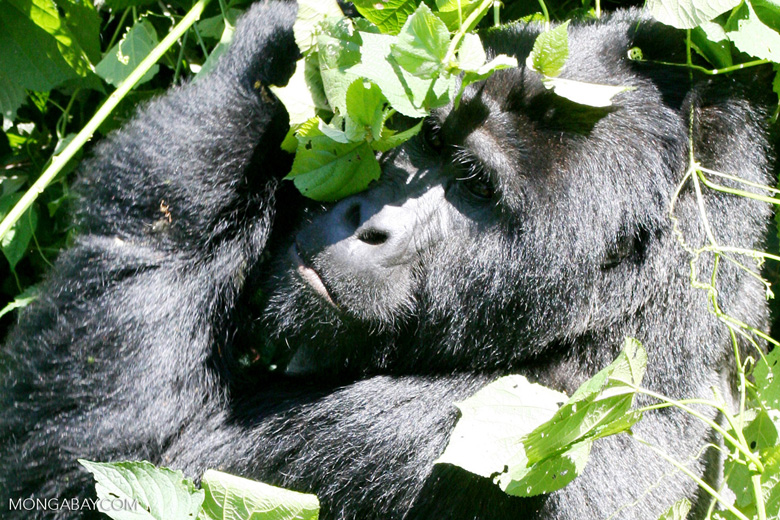- An investigation by Greenpeace finds that since February, DRC’s environment ministry has handed over control of three logging concessions in Congo Basin rainforest to Chinese-owned logging companies. Two of these concessions are located in a massive peatland – the largest in the tropics – that was discovered last year.
- Fourteen more concessions are expected to be awarded to companies in the coming months.
- The DRC government is also reportedly planning to declassify large portions of Salonga and Virunga national parks to allow oil exploration. Virunga is one of the last bastions of critically endangered mountain gorillas.
- These moves threaten a long-standing logging moratorium in the country, as well as forest protection agreements between the DRC and other countries.
Concern is mounting for the Democratic Republic of Congo’s (DRC) vast forests and rich wildlife as logging concessions and licenses to explore for oil in protected areas are prepared ahead of presidential elections later this year.
A moratorium on industrial logging, in place since 2002, has been broken with three concessions reportedly handed out by DRC environment minister Amy Ambatobe to Chinese-owned logging companies since February.
A further 14 logging concessions are expected to be granted within months, according to Unearthed, Greenpeace’s investigative unit.
In addition, reports referenced by Greenpeace indicate the government is preparing to reclassify large areas inside Salonga and Virunga national parks, both of which are UNESCO World Heritage sites.
DRC holds 60 percent of the world’s second largest rainforest and critics say plans to further exploit it severely undermine the Central African Forest Initiative (CAFI), a multi-million dollar development and conservation project, established by the Norwegian government with international support in 2015.

Norway’s environment minister Ola Elvestuen told Greenpeace that he took the concerns “very seriously.”
“This forest is key to the future of humanity. Without protecting the Congo Basin forests, it is hard to see how we can meet the 1.5-2 degrees climate goals.
“The geopolitical consequences of not protecting the Congo Basin would be dramatic,” she said. “We therefore need all partners to rally behind this work. The more united we are, the more we will achieve.”
Two of the three logging concessions awarded in February are in the Cuvette Centrale region of DRC, a highly sensitive ecological area that includes what is believed to be the world’s biggest tropical peatland, estimated to store over 30 billion metric tons of carbon.
Simon Lewis, professor of global change science at University College London, UK, who was part of the team that discovered the peatlands earlier this year, told Greenpeace that allowing logging in this part of Congo would be “irresponsible.”
“These peat forests are some of the most carbon-dense ecosystems in the world, and should to be left for local people to continue to manage sustainably,” he said.
One of the oil concessions, allocated to Compagnie Minières Congolaise (Comico), encroaches on Salonga National Park, Africa’s largest tropical rainforest reserve. The pristine rainforest is home to bonobos, forest elephants and Congo peafowl.
The other, in Virunga National Park in eastern Congo, is home to critically endangered mountain gorillas. British oil company SOCO International carried out seismic testing before letting its license lapse in 2015 following an outcry by conservationists.

The Congolese government has said that logging in the Cuvette peatlands would be impossible because of its wetland topography and has defended its right to authorize drilling anywhere in the country.
Berta Pesti, lead official at CAFI, said she was very concerned. “No one thought working in DRC was going to be an easy ride. The moratorium is in place and until the conditions in DRC’s own legal framework are met, no new contracts should be signed.”
Unrest is growing in DRC ahead of the delayed presidential election in December that is due to choose a successor to Kabila, who has governed since 2001 and is not allowed to continue in the role.
But Kabila has so far refused to commit to standing down, sparking protests. In March, the bodies of two UN investigators and 40 decapitated policemen were found in the central province of Kasai, a stronghold of opponents to Kabila. The violence was part of a new conflict in the region that has reportedly seen over a million people displaced.
Ben Shepherd, Africa policy analyst at the Royal Institute of International Affairs in London said that Kabila’s government was likely to be using DRC’s vast natural resources to build a “war chest” to fight the presidential election.
“One of the things that people allege is that the government is looking to use Congo’s assets and natural resources to build a war chest to fight elections,” Shepherd said. “Kabila is not popular, but he does have resources and a degree of political organization across the country. In a place like Congo, money goes a long way in politics. And it’s fairly axiomatic in Congo that money going into the government’s coffers doesn’t all get accounted for.”
Feedback: Use this form to send a message to the editor of this post. If you want to post a public comment, you can do that at the bottom of the page.
